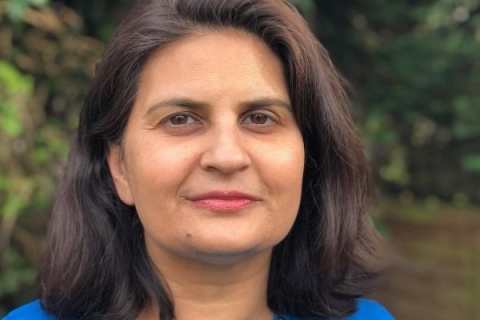

We asked alumni to tell us their thoughts on advancements and challenges in their own areas, and their expert opinion on the future technology
4 min read
With Future and Emerging Technologies being one of the University of Portsmouth’s key research themes, we asked alumni to tell us their thoughts on advancements and challenges in their own areas, and their expert opinion on the future technology.
BSc (Hons) Pharmacology ‘89 graduate, Siddhi Trivedi, is founder of Beyond Identity: a startup that’s developing an app with a local primary care trust to simplify and assist doctors delivering both cost-effective and efficient high quality care provision.
Siddhi is truly passionate about digital health as well as increasing the number of girls and women who choose a career in tech. Here Siddhi tells us why she chose to work in technology and how she sees the future of healthcare from a global perspective.
My passion
When I studied Pharmacology in the 1980’s at Portsmouth, a coding and computer science module was compulsory; I had never envisaged that this gentle introduction would become a window of opportunity to a future in digital health where I have built my career over the past decade.
However, I feel discrimination has become more transparent and magnified by digital systems overseen by institutions exploiting big data and decision-making algorithms, that are often biased. And this is mostly because I think those who are behind the programming of such algorithms are themselves biased. This is one of the reasons I have become a passionate advocate for encouraging girls to give serious consideration to careers in tech because we need more coders and data scientists from diverse backgrounds, especially those who identify as women.
I therefore set up Project BIBA to introduce girls at an early age to all things tech. To equip and prepare them for a digital career, whether it be in fashion or astrophysics!
The future of emerging technologies in healthcare
We are observing a seismic change in the economy with a booming internet and a rapid adoption of IT in our daily lives, which is pushing us into a data driven economy where business models are based on analysing data, making big data and artificial intelligence the most valuable emerging tech in all aspects of our life.
There is no doubt in anyone’s mind that since Covid-19, technology has been rapidly adopted to keep businesses and communities connected.
This pandemic has accelerated the uptake of newer technologies and platforms, such as the NHS app for appointment booking and patient record access, and the rollout of video conferencing software to enable remote working and collaboration between clinicians and caregivers. The most significant impact worldwide has been the development of the Covid-19 vaccine in record time using sophisticated mRNA technology.
The global healthcare industry has needed to play catch up and begin to utilise this rich data to improve health outcomes. My tech company has been working with healthcare providers within the NHS to develop digital tools to improve patient management.
Siddhi Trivedi, BSc (Hons) Pharmacology '98, Founder of Beyond Identity
The application of IoT (Internet of Things) for remote patient monitoring and wellness apps has empowered individuals to take control of their own health by using this data to help them make changes to their lifestyle.
Healthcare on a global scale
On a global level, digital technologies, such as artificial intelligence (AI), can enable this transformation to achieve universal health coverage (UHC) by 2030.
There are some great examples from many countries which are well-placed to harness these benefits especially as the use of IoT devices continues to surge and improve exponentially. AI and IoT, combined with 5G, will dramatically change how healthcare is delivered today, particularly for people living in hard-to-reach areas.
A great example is Rwanda, with a population of 12 million, has invested in cables and broadband with 90% of the country being covered by 4G, and some areas with 5G. As a result, they have been able to deliver affordable healthcare via telemedicine to remote villages.
In the future, we will see artificial intelligence applied in predictive medicine, and IoT sensors in clothes and smart pills for medical adherence and assisted living.
Security concerns
However, let’s not ignore that security concerns such as data breaches are increasing risks as we generate more data. The development of blockchain technology has the potential to address this.
Many people are familiar with blockchain-hosted crypto-currencies such as Bitcoin or blockchain software, but few know about the many potential applications or technical details behind the technology. The most crucial element of this technology is that every transaction on a block incorporates a previous block, forming a chain of encrypted blocks (hence the term blockchain).
This feature makes the blockchain highly secure and very difficult to hack. It also allows for the instant transfer of funds or information without the need for an intermediary, unlike banking services. This makes the transaction of currencies or sharing of information more efficient, affordable and secure.
